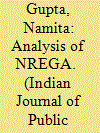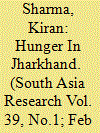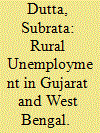| Srl | Item |
| 1 |
ID:
099134


|
|
|
| 2 |
ID:
163586


|
|
|
|
|
| Summary/Abstract |
The realities of starvation and hunger in South Asia are only partially addressed by larger discourses on food security. At the local level, many Indians continue to experience hunger, semi-starvation and malnutrition. While the age of mass starvation seems over, starvation deaths are reported from time to time, and hunger remains a lurking threat. This ethnographic study analyses patterns of poverty and food (in)security among tribal and other social groups in seven villages of the Manatu block in Palamu district of Jharkhand. The empirical findings present the main factors influencing the dynamics of household food (in)security and examine, through some case studies, how poor rural/tribal communities cope with threats of starvation and hunger. The article also critically analyses the implementation of social policies in addressing food security in Jharkhand and finds that more needs to be done to assist the most vulnerable individuals, including many women, to escape the precarities of hunger.
|
|
|
|
|
|
|
|
|
|
|
|
|
|
|
|
| 3 |
ID:
163585


|
|
|
|
|
| Summary/Abstract |
Rural employment generation was initiated in India through the National Rural Employment Guarantee Act (NREGA) in 2005 and related NREGS schemes, to provide better social and food security to socially and economically depressed rural workers. By now, the implementation of this scheme is known to be not equally satisfactory throughout India, with significant variations in different states and localities. This article, based on intensive fieldwork over 1 year in remote villages of Deogarh and Bhim blocks of Rajasamand district, explores the functioning of the scheme in rural Rajasthan. It identifies three important roadblocks to effective NREGA implementation and analyses their impact: persistence of caste-based inequalities and social interactions among different groups of rural people, differential occupational interests of potential workers and lack of initiative of the respective panchayats.
|
|
|
|
|
|
|
|
|
|
|
|
|
|
|
|
| 4 |
ID:
163584


|
|
|
|
|
| Summary/Abstract |
Based on NSSO data sets, this study covers the period from 1993 to 2010 and focuses on a comparison of rural unemployment in Gujarat and West Bengal, chosen because of their contrasting characteristics. In the past few decades, Gujarat has emphasised growth through modern industrial production, while under a different ideological regime, West Bengal aimed to achieve agricultural growth, land reform and more egalitarian patterns of agricultural incomes. Recent evidence suggests that meanwhile Gujarat’s agriculture has registered high growth in output during 2000–08, while West Bengal has failed to kick off industrialisation, despite making some pressing efforts. The article clearly identifies the limited scope for agriculture to provide full employment for all young rural people in India. However, given the important role of the agricultural sector in safeguarding national food security, it becomes obvious that apart from careful attention to agricultural developments, sustainable alternatives to traditional agricultural employment need to be activated. The concluding section therefore considers various policy options for tackling the risks of rural unemployment and underemployment in India.
|
|
|
|
|
|
|
|
|
|
|
|
|
|
|
|